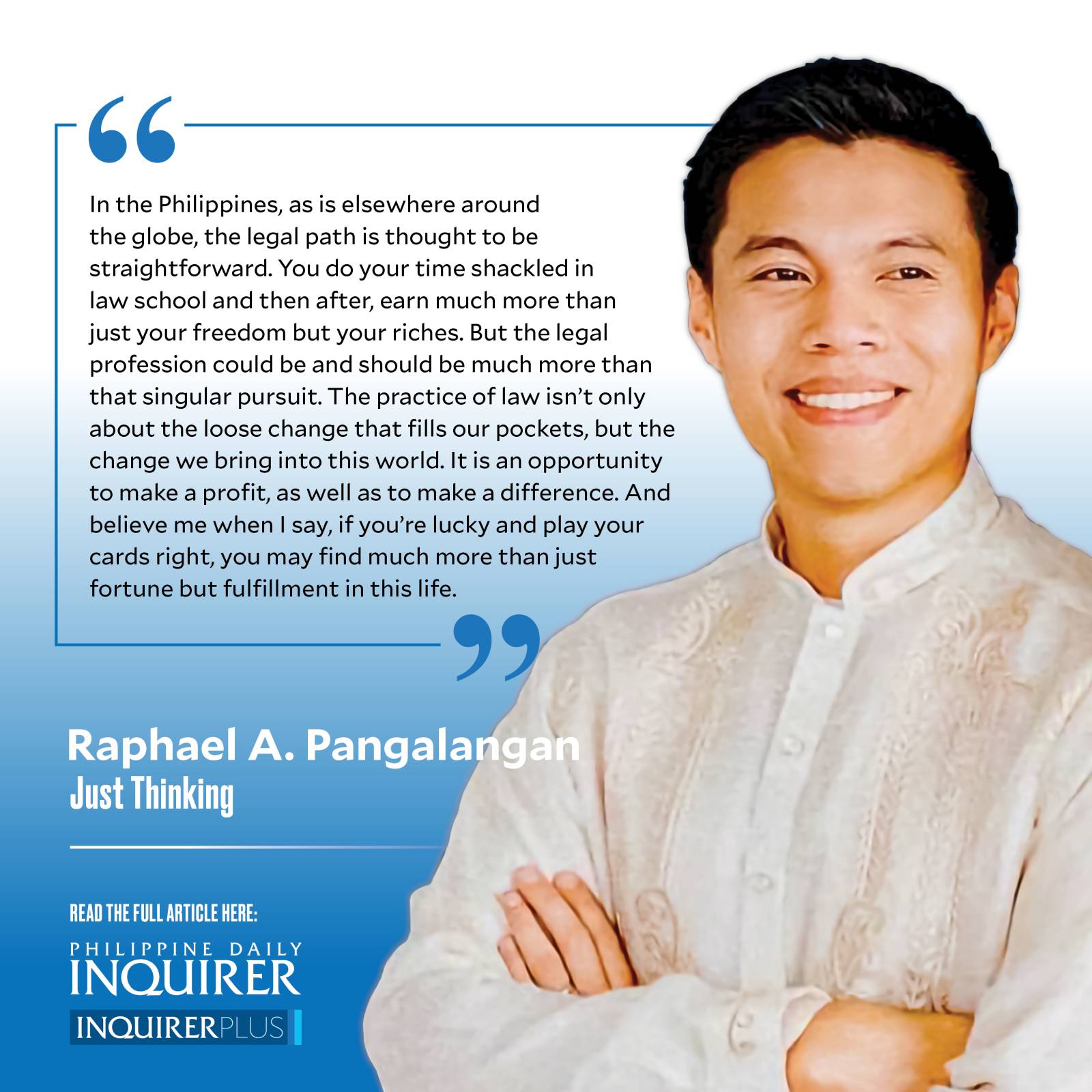Redefining legal success

Once more, we find ourselves at that time of the year.
The Bar exam, a rite of passage both feared and fantasized, has placed over 9,000 law graduates in a delicate limbo of anticipation and trepidation. With the outcome of the 2022 Bar examinations slowly creeping closer, aspirants across the nation are caught and enveloped by that Schrödingerian feeling. Alas, the Bar exam is both the dreaded and the dreamed.
I empathize with them completely. As someone who has faced this crucible not just once but twice—first for the Philippine Bar in 2016, and more recently for the New York Bar—I remember the nerve-wracking uncertainty, the sacrifices made, and the dreams woven all too well. Yet, I also recognized then as I do now that passing the Bar is merely the start of an even greater odyssey. As these young legal minds embark on their professional lives, I hope to share with them some insights that I, in my own journey, have picked up along the way.
We hark back to the summer of 2012. The law aptitude exam results had just been released and I was heckled by friends and family. They asked: What field of law do you plan to practice? To me, there was one clear choice. With peso symbols in my eyes, I answered: banking.
In retrospect, this response was well-nigh comical. Anyone who can even claim to remotely know me could tell you that this field is the farthest thing from my interest. Sure, I’ve had my share of banking and anti-money laundering cases, but never would I claim that this is the field in which I have found purpose. I mean, sure I may know how to swim. But that doesn’t mean I go around telling people I’m a swimmer. Today, I’ve been introduced in fora here and abroad in a number of ways; as public advocate, human rights lawyer, scholar, professor—among which my envisioned-self circa 2012 would see a stranger.
So one may ask: What happened? How is it, that in a span of 10 years, between points A and B plotted in the timeline, the banking law aspirant decided to become a public interest lawyer?
I can pinpoint the answer to a single summer. It was 2013 and the country underwent a “calendar shift” moving the start of the academic year from June to August. This gifted us students (and now, I realize, professors) a four-month break instead of the usual two.
I had landed two internship posts that summer: one with one of the Philippines’ largest law firm in Makati and another with the Khmer Rouge Tribunal in Phnom Penh. During the first half of the summer I was drafting memos on contract law and commercial transactions in the country’s central business district, and in the latter I found myself in the unnamed and numbered streets of Cambodia’s capital documenting crimes against humanity and genocide.
The first bit was all too familiar to me—indeed, I had already watched my fair share of “Suits” at the time. But the latter was something strange, something new, and nothing short of epiphanic. Instead of staring down documents in a cubicle, I engaged with victims of unspeakable crimes and their families left behind. It was there that I learned that law was not just rigid legalese, but a dynamic and flexible tool that responds to the challenges and opportunities of our times. There, I saw law as more than just a system of rules, but as a reflection of our values and aspirations as a people.
I had no idea the law could work that way, and I came back to the Philippines a changed man with changed aspirations. The rest is, as they say, LinkedIn history. Today, I continue my public advocacies with the Center for International Law—Philippines.
In the Philippines, as is elsewhere around the globe, the legal path is thought to be straightforward. You do your time shackled in law school and then after, earn much more than just your freedom but your riches. But the legal profession could be and should be much more than that singular pursuit. The practice of law isn’t only about the loose change that fills our pockets, but the change we bring into this world. It is an opportunity to make a profit, as well as to make a difference. And believe me when I say, if you’re lucky and play your cards right, you may find much more than just fortune but fulfillment in this life.
For those who may falter in their Bar exam quest, take heart. Failure does not define your worth, nor does it spell the end of your legal aspirations. Renowned jurists like Justice Benjamin N. Cardozo and Stanford Law School Dean Kathleen Sullivan stumbled on their first attempts. These setbacks did not deter them, and neither should they deter you.
The legal practice will be what you make it. May you strive to make it better.
——————–
thinkjustly@gmail.com
###—###
#ColumnName
















